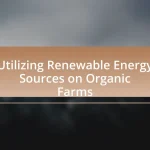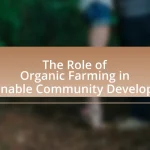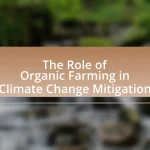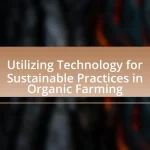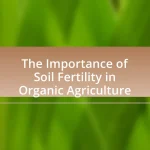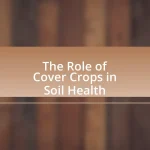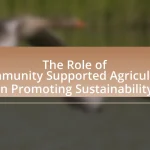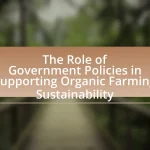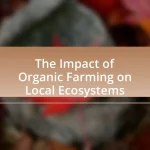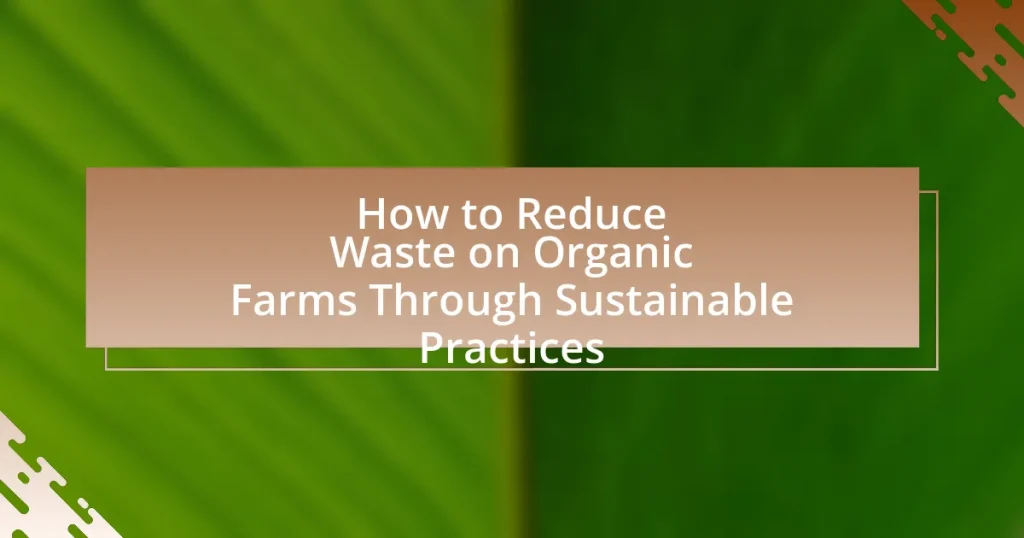The article focuses on sustainable practices for reducing waste on organic farms, highlighting methods such as composting, crop rotation, and integrated pest management. These practices not only minimize landfill contributions but also enhance soil health and promote biodiversity. Key strategies discussed include optimizing resource use, employing precision agriculture technologies, and engaging in community education to foster awareness and collaboration in waste reduction efforts. The article emphasizes the environmental and economic benefits of waste reduction, illustrating how these practices contribute to a more sustainable agricultural system.
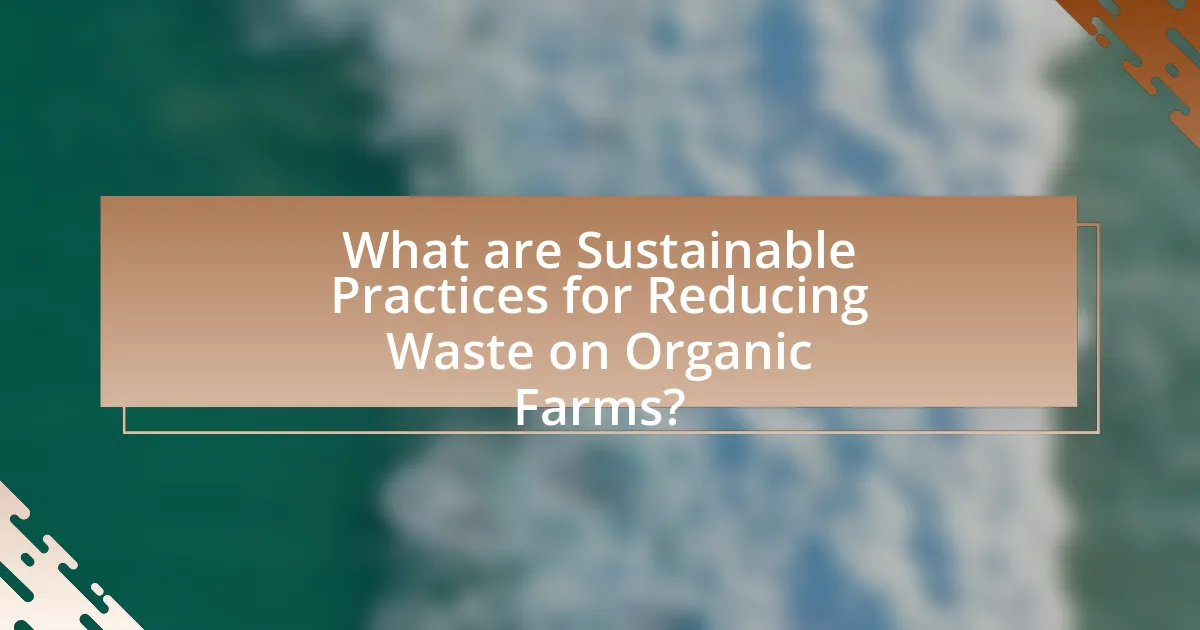
What are Sustainable Practices for Reducing Waste on Organic Farms?
Sustainable practices for reducing waste on organic farms include composting, crop rotation, and integrated pest management. Composting allows organic waste, such as plant residues and manure, to decompose into nutrient-rich soil amendments, thereby minimizing landfill contributions and enhancing soil health. Crop rotation helps maintain soil fertility and reduces pest and disease cycles, leading to less reliance on chemical inputs and waste generation. Integrated pest management combines biological, cultural, and mechanical practices to control pests sustainably, reducing the need for chemical pesticides and associated waste. These practices are supported by research indicating that organic farming methods can significantly lower waste production while promoting environmental sustainability.
How do sustainable practices contribute to waste reduction?
Sustainable practices contribute to waste reduction by promoting efficient resource use and minimizing environmental impact. For instance, composting organic waste on farms transforms food scraps and plant materials into nutrient-rich soil amendments, reducing landfill waste by approximately 30% according to the Environmental Protection Agency. Additionally, implementing crop rotation and cover cropping enhances soil health, which leads to reduced reliance on chemical fertilizers and pesticides, further decreasing waste associated with their production and application. These practices not only lower waste generation but also foster a circular economy within agricultural systems, demonstrating their effectiveness in waste reduction.
What specific sustainable practices can be implemented on organic farms?
Specific sustainable practices that can be implemented on organic farms include crop rotation, cover cropping, and integrated pest management. Crop rotation enhances soil health and reduces pest and disease cycles by alternating different crops in a specific sequence. Cover cropping, which involves planting crops like clover or rye during off-seasons, improves soil structure, prevents erosion, and enhances nutrient cycling. Integrated pest management employs biological controls, such as beneficial insects, to minimize chemical pesticide use, thereby promoting biodiversity and reducing environmental impact. These practices collectively contribute to waste reduction and sustainability on organic farms by maintaining ecological balance and enhancing resource efficiency.
How do these practices impact the overall farm ecosystem?
Sustainable practices significantly enhance the overall farm ecosystem by promoting biodiversity, improving soil health, and reducing waste. These practices, such as crop rotation, composting, and integrated pest management, contribute to a balanced ecosystem by fostering a variety of plant and animal species, which in turn supports natural pest control and pollination. For instance, crop rotation helps prevent soil depletion and reduces the need for chemical fertilizers, leading to healthier soil microbiomes. Research indicates that farms employing sustainable practices can see a 30% increase in soil organic matter, which is crucial for nutrient retention and water infiltration. Additionally, composting organic waste reduces landfill contributions and enriches soil, further supporting plant growth and ecosystem resilience.
Why is waste reduction important for organic farming?
Waste reduction is crucial for organic farming because it enhances sustainability and resource efficiency. By minimizing waste, organic farms can reduce their environmental impact, conserve natural resources, and improve soil health. For instance, a study published in the Journal of Cleaner Production found that implementing waste reduction strategies can lead to a 30% decrease in greenhouse gas emissions on farms. This evidence underscores the importance of waste reduction in promoting ecological balance and ensuring the long-term viability of organic farming practices.
What are the environmental benefits of reducing waste?
Reducing waste has significant environmental benefits, including decreased pollution and conservation of natural resources. By minimizing waste, organic farms can lower greenhouse gas emissions, as landfills are a major source of methane, a potent greenhouse gas. According to the Environmental Protection Agency, landfills accounted for approximately 14.1% of methane emissions in the United States in 2019. Additionally, reducing waste leads to less energy consumption and water usage in the production of new materials, which helps preserve ecosystems and biodiversity. For instance, recycling one ton of paper can save 17 trees, 7,000 gallons of water, and 4,100 kilowatts of electricity. Therefore, waste reduction directly contributes to a healthier environment by mitigating climate change and conserving vital resources.
How does waste reduction affect farm profitability?
Waste reduction positively affects farm profitability by lowering operational costs and increasing resource efficiency. When farms minimize waste, they reduce expenses related to disposal, labor, and materials, which directly enhances their bottom line. For instance, a study by the Food and Agriculture Organization (FAO) indicates that reducing food waste can lead to savings of up to 30% in production costs. Additionally, efficient use of resources, such as water and fertilizers, not only cuts costs but also improves crop yields, further boosting profitability. Therefore, implementing waste reduction strategies is a critical factor in enhancing the financial performance of farms.

What are the Key Strategies for Implementing Waste Reduction?
Key strategies for implementing waste reduction include adopting composting practices, optimizing resource use, and enhancing recycling efforts. Composting organic waste transforms it into valuable soil amendments, reducing landfill contributions. Optimizing resource use involves careful planning and management of inputs, such as water and fertilizers, to minimize excess and waste. Enhancing recycling efforts ensures that materials are repurposed effectively, diverting waste from landfills and promoting a circular economy. These strategies are supported by studies indicating that composting can reduce waste by up to 30%, while efficient resource management can lead to significant cost savings and environmental benefits.
How can composting be utilized to reduce waste?
Composting can be utilized to reduce waste by transforming organic materials, such as food scraps and yard waste, into nutrient-rich soil amendments. This process diverts approximately 30% of waste from landfills, where organic matter would otherwise decompose anaerobically, producing methane, a potent greenhouse gas. By composting, organic farms can recycle nutrients back into the soil, enhancing soil health and reducing the need for chemical fertilizers. Studies indicate that composting can reduce landfill waste significantly, with the U.S. Environmental Protection Agency reporting that composting and other organic recycling methods can prevent millions of tons of waste annually.
What materials are suitable for composting on organic farms?
Suitable materials for composting on organic farms include kitchen scraps, yard waste, animal manure, and certain agricultural byproducts. Kitchen scraps such as fruit and vegetable peels, coffee grounds, and eggshells provide nitrogen and carbon, essential for microbial activity. Yard waste, including grass clippings, leaves, and small branches, contributes carbon and helps aerate the compost. Animal manure from herbivores like cows and horses is rich in nutrients and accelerates decomposition. Additionally, agricultural byproducts like straw, hay, and crop residues can enhance compost quality. These materials are effective because they promote a balanced carbon-to-nitrogen ratio, which is crucial for successful composting.
How does composting improve soil health and reduce waste?
Composting improves soil health by enhancing its structure, fertility, and microbial activity while simultaneously reducing waste by diverting organic materials from landfills. The addition of compost increases soil organic matter, which improves water retention, aeration, and nutrient availability, leading to healthier plant growth. Furthermore, composting reduces waste by recycling food scraps, yard waste, and other organic materials, which can account for up to 30% of landfill content. This process not only minimizes methane emissions from decomposing organic matter in landfills but also contributes to a circular economy by returning nutrients to the soil.
What role does crop rotation play in waste management?
Crop rotation plays a significant role in waste management by enhancing soil health and reducing the accumulation of pests and diseases. By alternating different crops in a specific sequence, farmers can improve nutrient cycling and minimize the need for chemical fertilizers, which often contribute to environmental waste. Research indicates that crop rotation can lead to a 10-20% increase in crop yields while simultaneously decreasing the reliance on synthetic inputs, thus reducing agricultural waste. This practice not only promotes biodiversity but also helps in managing organic waste by incorporating cover crops that can be tilled back into the soil, further enriching it and reducing waste disposal needs.
How does crop rotation minimize pest and disease issues?
Crop rotation minimizes pest and disease issues by disrupting the life cycles of pests and pathogens that thrive on specific crops. When different crops are planted in succession, it reduces the likelihood of pests and diseases establishing themselves, as they often rely on a single crop for survival and reproduction. For example, rotating crops such as legumes with cereals can break the cycle of pests like root maggots, which prefer certain plants. Research has shown that farms employing crop rotation experience lower pest populations and reduced disease incidence, leading to healthier crops and improved yields.
What are the long-term benefits of crop rotation for waste reduction?
Crop rotation significantly reduces waste in the long term by enhancing soil health and optimizing resource use. This practice prevents nutrient depletion, as different crops utilize varying soil nutrients, leading to improved soil fertility and reduced need for chemical fertilizers. Research indicates that crop rotation can decrease soil erosion by up to 50%, which minimizes the loss of topsoil and organic matter, further contributing to waste reduction. Additionally, rotating crops disrupts pest and disease cycles, reducing the reliance on pesticides and lowering agricultural waste associated with chemical applications. These benefits collectively lead to a more sustainable farming system that effectively manages resources and minimizes waste.
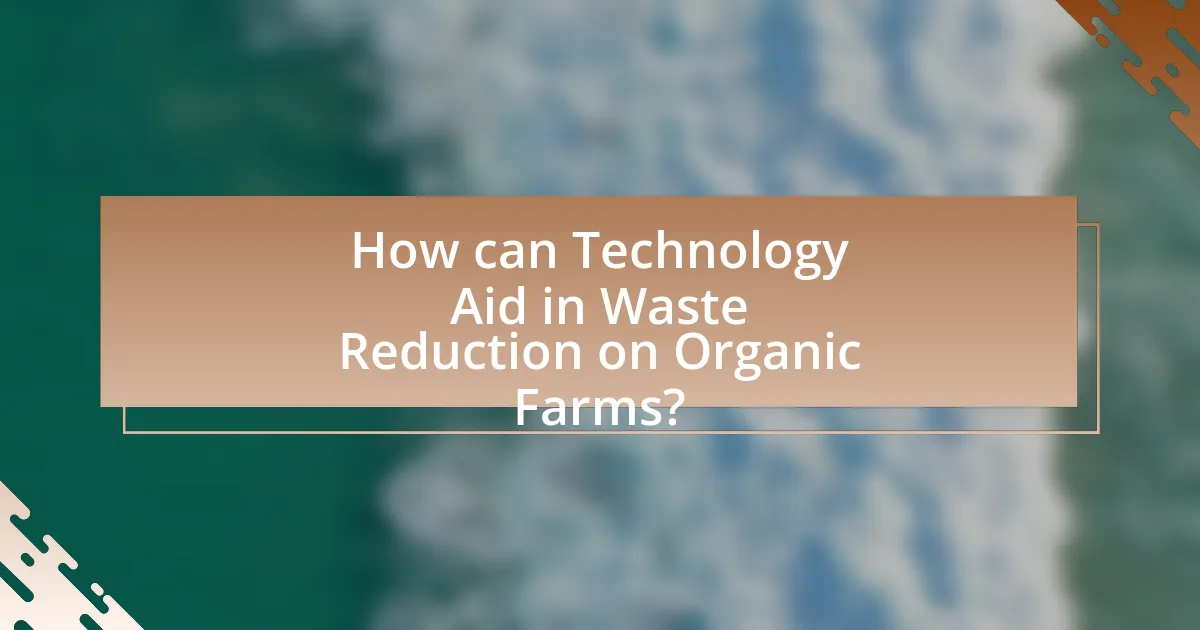
How can Technology Aid in Waste Reduction on Organic Farms?
Technology can aid in waste reduction on organic farms by implementing precision agriculture tools, which optimize resource use and minimize waste. These tools, such as soil sensors and drones, provide real-time data on soil health and crop conditions, allowing farmers to apply water, fertilizers, and pesticides more efficiently. For instance, a study published in the journal “Agricultural Systems” found that precision agriculture can reduce fertilizer use by up to 30%, significantly decreasing nutrient runoff and waste. Additionally, technologies like composting systems and anaerobic digesters convert organic waste into valuable resources, further enhancing sustainability on organic farms.
What technologies are available for monitoring waste on farms?
Technologies available for monitoring waste on farms include IoT sensors, drones, and data analytics software. IoT sensors can track waste levels in real-time, providing farmers with immediate data on waste accumulation and enabling timely interventions. Drones equipped with imaging technology can survey large areas to identify waste hotspots and assess overall farm conditions. Data analytics software processes the collected data to generate insights on waste management practices, helping farmers optimize their operations. These technologies enhance efficiency and sustainability in waste management on farms.
How can data analytics improve waste management practices?
Data analytics can significantly improve waste management practices by enabling data-driven decision-making and optimizing resource allocation. By analyzing waste generation patterns, organizations can identify key areas for reduction and implement targeted strategies. For instance, a study by the Environmental Protection Agency found that businesses using data analytics reduced waste by up to 30% through better inventory management and forecasting. Additionally, predictive analytics can forecast waste generation trends, allowing for proactive measures to minimize waste before it occurs. This approach not only enhances operational efficiency but also contributes to sustainability goals by reducing landfill contributions and promoting recycling initiatives.
What are the benefits of using precision agriculture in waste reduction?
Precision agriculture significantly reduces waste by optimizing resource use and enhancing crop management. This approach employs technologies such as GPS, sensors, and data analytics to monitor and manage field variability, leading to precise application of inputs like water, fertilizers, and pesticides. For instance, a study by the USDA found that precision agriculture can reduce fertilizer use by up to 30%, which directly minimizes excess runoff and waste. Additionally, by improving crop yield predictions, farmers can better align production with market demand, thereby decreasing food waste. These benefits demonstrate how precision agriculture effectively contributes to waste reduction in organic farming practices.
How can farmers educate themselves and their communities about waste reduction?
Farmers can educate themselves and their communities about waste reduction by participating in workshops and training programs focused on sustainable agricultural practices. These educational initiatives often cover topics such as composting, recycling, and efficient resource management, which are essential for minimizing waste on organic farms. Research indicates that farmers who engage in community-based education programs can significantly reduce waste; for example, a study published in the Journal of Cleaner Production found that farmers who implemented training on waste management techniques reduced their organic waste by up to 30%. Additionally, farmers can leverage social media and local agricultural extension services to disseminate information and share best practices, further enhancing community awareness and involvement in waste reduction efforts.
What resources are available for learning sustainable practices?
Resources available for learning sustainable practices include online courses, books, workshops, and community programs. Online platforms such as Coursera and edX offer courses on sustainability and organic farming, while books like “The Sustainable Agriculture Handbook” provide in-depth knowledge. Workshops organized by agricultural extension services and local universities often focus on practical applications of sustainable practices. Additionally, community programs and non-profit organizations, such as the Sustainable Agriculture Research and Education (SARE) program, offer resources and support for farmers looking to implement sustainable methods. These resources are validated by their widespread use in educational settings and their contributions to advancing sustainable agriculture practices.
How can community involvement enhance waste reduction efforts?
Community involvement enhances waste reduction efforts by fostering collaboration and increasing awareness among individuals about sustainable practices. Engaging local residents in initiatives such as community clean-up events, recycling programs, and educational workshops leads to a collective commitment to reducing waste. For instance, a study by the Environmental Protection Agency found that communities with active participation in waste reduction programs can achieve up to a 30% decrease in landfill waste. This collaborative approach not only empowers individuals to take responsibility for their waste but also creates a supportive network that encourages ongoing sustainable behaviors.
What are the Best Practices for Reducing Waste on Organic Farms?
The best practices for reducing waste on organic farms include implementing composting systems, utilizing crop rotation, and adopting precision agriculture techniques. Composting systems convert organic waste into valuable soil amendments, thereby minimizing landfill contributions and enhancing soil health. Crop rotation helps maintain soil fertility and reduces pest and disease cycles, leading to less waste from failed crops. Precision agriculture techniques, such as using data analytics and GPS technology, optimize resource use and minimize excess inputs, which further reduces waste. These practices are supported by studies indicating that composting can reduce farm waste by up to 30%, and precision agriculture can increase efficiency by 15-20%, demonstrating their effectiveness in waste reduction.
How can farmers create a waste reduction plan tailored to their operations?
Farmers can create a waste reduction plan tailored to their operations by conducting a comprehensive waste audit to identify sources and types of waste generated on their farms. This audit allows farmers to quantify waste, categorize it, and prioritize areas for reduction. For instance, a study by the USDA found that farms implementing waste audits reduced their organic waste by up to 30% through targeted interventions. Following the audit, farmers should set specific, measurable goals for waste reduction, such as minimizing packaging waste or improving composting practices. Additionally, integrating sustainable practices like crop rotation and cover cropping can enhance soil health and reduce waste from chemical inputs. By continuously monitoring progress and adjusting strategies based on outcomes, farmers can effectively tailor their waste reduction plans to their unique operational needs.
What common challenges do farmers face in implementing waste reduction strategies?
Farmers commonly face challenges such as financial constraints, lack of knowledge, and inadequate infrastructure when implementing waste reduction strategies. Financial constraints limit farmers’ ability to invest in new technologies or practices that could enhance waste management. A lack of knowledge about effective waste reduction techniques can hinder the adoption of sustainable practices, as farmers may not be aware of available resources or methods. Additionally, inadequate infrastructure, such as insufficient composting facilities or recycling options, can obstruct the implementation of waste reduction strategies, making it difficult for farmers to manage organic waste effectively.
